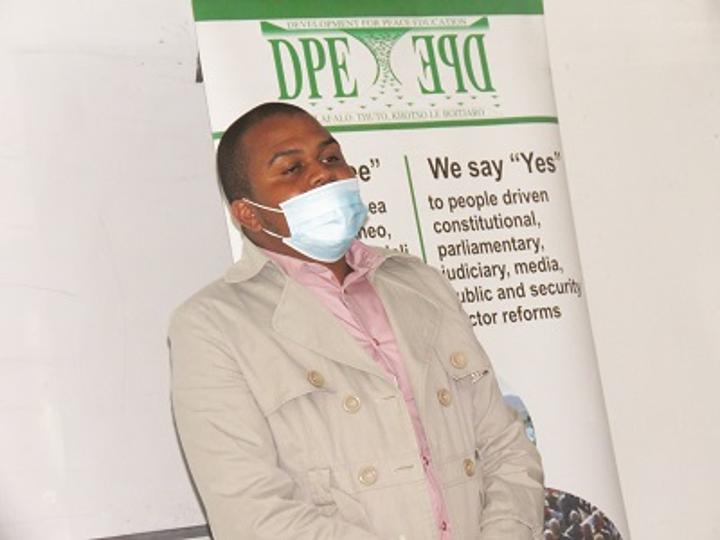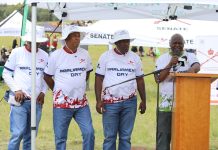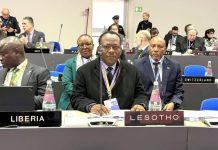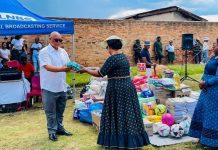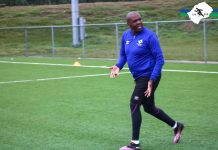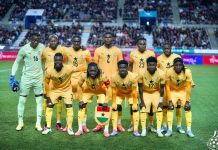Africa-Press – Lesotho. The Development for Peace Education (DPE) had on Thursday last week held a dialogue session for Citizens’ Mobilisation Organisations (CMOs) aimed at bringing members of the public up to
speed with the latest developments and the ground covered by the ongoing multi-sector national reforms. The physical forum was held at Maseru and other places were connected virtually.
The members of the CMOs engaged on the deliberations from as far as Lebakeng, ‘Mamaebana, Mantšonyane, Seforong, Kuebunyane and Hloahloeng. The CMO’s representative in the
National Reforms Authority (NRA) Sofonea Shale interacted with the members of the public, physically and virtually, about the reforms and the NRA challenges.
The DPE’s Peace Education Researcher, Lemohang Molibeli told participants that the dialogue is borne by the citizens’ mobilisation organisation of the NRA Act 2019.
The Chairperson of the CMOs Nthoana Mohapi said fora such as these are helpful as the public is able to establish what is happening at the NRA and “how far” is the process of the reforms.
“There is a need for platforms such as these for those who have been sent [to represent certain groups and
interests] to report back on the progress,” he said. The NRA members were sworn in on February 6th earlier this year. Of the 95 members of the NRA, 35
represent political parties including those represented in parliament, in opposition and those outside the parliament. Since installation of the NRA members
there have been challenges that had hampered the progress of the reforms from continuing. The NRA had come at loggerheads with the government on the availability of the
funds. Despite government’s resolve to “expeditiously implement the reforms for Lesotho’s own benefit” the progress has been slow to this effect. The authority had recently engaged
the Secretariat staff who will carry out the implementation process of the reforms. In The Lesotho We Want: Dialogue and Reforms for National Transformation,
Vision Overview and Roadmap, the government holds thus: “In the past few years, there has been a growing recognition that Lesotho needs to undertake far-reaching reforms to
ensure stability and prosperity. Basotho deserve to live in a stable, peaceful and secure environment and be assured of the enjoyments of their rights and
efficient service delivery. “As the government, we owe it to the country and to our well-meaning neighbours to take ownership of the destiny of our nation….
This way, the support and goodwill of our regional neigbours will not have been in vain. To do otherwise will be tantamount to squandering the goodwill extended to us and
gravely compromising the prosperity of future generations. The time has come to change the course of our beloved Kingdom. ” The reforms were borne by reports on
Southern African Development Community (SADC) intervention efforts in Lesotho. They also came owing to the recommendations of the SADC Commission of Inquiry on the Death of Lt.
Gen. Maaparankoe Mahao which was produced by The Phumapi Report in 2016. Also there, the Commonwealth Secretariat report on strengthening the coalition governments following a study
of tour to New Zealand by a Lesotho delegation to borrow a leaf from that country as it is deemed one of the success stories of coalition ruling administration.
The Southern African Development Community Mission to the Kingdom of Lesotho (SOMILES) 2015 report recommended reforms on the security institutions. In preparation of the reforms process
the Multi-Stakeholder National Dialogue (MSND) which encompassed the views of the wide majority of the citizens. The MSND was succeeded by the National
Leaders Forum which its composition was made of political leaders. There was also the National Plenary 1, which had spearheaded the national dialogue.
Following this, were In-district consultations which were facilitated by the civil society organisations. The National Plenary 2, combined the feedback from the districts on the national
dialogue. The government then, mounted the National Dialogue Planning Committee (NDPC) which oversaw the national dialogue process. It was after the dissolution of the NDPC that the NRA was born which
is currently faced with implementation of the reforms. During the process of engagement, the dialogue and consultations were under the watch of the SADC Mediator the then
Deputy President of South Africa Cyril Ramaphosa whom after assuming Presidency delegated the retired Deputy Chief Justice Dikgang Moseneke who is still the
mediator. The CMO’s representative at the NRA, Shale said through the reforms Basotho have found the common ground for their aspirations of the country.
Shale said, it is the responsibility of the NRA to ensure that such aspirations are enacted into laws. Asked what the NRA has done since inauguration of its members, he said the induction program was carried out for
the members. Shale also mentioned that the NRA’s communication strategy has been completed. He also told the participants that the Chairperson of NRA has attended many engagements with relevant stakeholders
pertaining to issues related to reforms. One of the challenges that the NRA is facing, he attributed to the working environment wherein there are “many”
political parties and the civil organisations usually do not see eye to eye on them. He went on to mention that some political parties are disconcerted with the
notion that the civil organisations would push for their deregistration as per Basotho wishes, who had shown that they do not want many parties. The other challenge, Shale said is
that NRA has a weakness of overreaching itself in doing things outside its perimeters. He said that the NRA has done “its part” on drawing the rules of procedure but the Minister of Justice and
Law had not signed for that document. The NRA’s Act affords that the Minister and NRA could jointly come up with laws that should guide the authority.
The ongoing squabble between the Minister and the Chairperson of NRA he said could delay the progress. He however said that DPE has taken stance to facilitate harmonious working
relations between the two. To achieve this, he said they have approached and had an audience with the NRA Chairperson, Transformation Resource Centre (TRC)’s Director General and civil organisations and said the
processes are underway to engage the Minister. Shale warned against “self-serving” representatives at NRA, highlighting that the representees’ interests ought to
be amplified at the authority. “It is irresponsible for the representatives to neglect their duties,” he charged. He said the reforms could go smoothly, highlighting that they have been through “worse”.
“NRA is an opportunity for Basotho to do for themselves and show their capabilities. It is up to Basotho to regroup
and do what is best for themselves,” he emphasized. The seven thematic areas which are going to be covered by the reforms are: security sector, media, the Judiciary,
the Constitution, public service, parliament and the economy. The NRA’s timeline is set for 12 months from when the Secretariat staff is engaged. The CMO’s representative further
challenged the representative to take action against those that derelict on their assignment. The represented organisations were Lesotho Workcamps Association (LWA), DPE, Community of Women Living with HIV
and the Student Christian Movement (SCM). DPE is a civil society organisation that seeks to empower people to realise their potential through and by peaceful means.
“Its work is rooted in reflections on the capacity of people to transform their current situation to achieve the higher standard of living which defines peace.
” If you would like to subscribe for informative newspaper FREE WhatsApp Edition,
please follow this link to join. The admin will then remove you from the welcome group so you start receiving the proper weekly: https://chat. whatsapp. com/loL8tStNSB186kQeMrb3Cg
For More News And Analysis About Lesotho Follow Africa-Press

